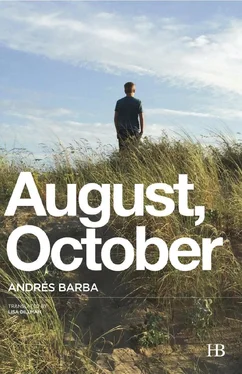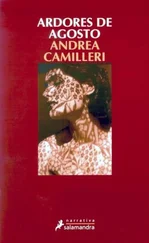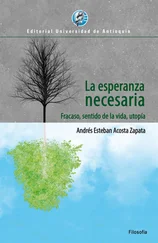“Help me, don’t just stand there like an imbecile.”
Marita took the bags.
She was a graceless woman, lusterless, and ugly in a way that was foreign to him and would probably remain foreign to him for the rest of his life, as though it had taken three generations to reach such extremes of ugliness. She looked very much like a man, her body overly stocky, but she had two spindly little legs that splayed as she walked, the tips of her toes pointing slightly outward.
“Who’s this?” she asked Marita directly, not even glancing at him. “A friend of yours?”
“No, a boy from summer.”
“My name is Tomás,” he said without anyone having asked, finding his voice.
“Yes, Tomás.”
“Come on, get a move on.”
“I’m leaving for Madrid tomorrow.”
The woman had already begun walking.
“OK,” Marita replied, taking the bags and trailing after her without looking back.
The memory begins there, when he wakes, when he looks into the mirror in the bathroom with no running water at Aunt Eli’s. He’s gone three days without showering and smells bad. Never in all his life has he smelled that bad, because never in all his life has he gone three days without showering; it’s an acrid smell, thick, one that he almost doesn’t recognize as coming from his own body, and it makes him feel a little bit ashamed. He tries to be reasonable, standing before that image, but when he moves he gets the sense that he should have done something else, without being exactly sure what. His chest moves out of sync with his breathing; like a tree trunk driven vertically into the mud, his balance is precarious. And he puts on his shirt and pants and packs everything he brought into his backpack to return to Madrid. Suddenly he’s relieved at the thought of going back to Madrid, he feels an expansive giddiness, nudging him back toward the side of life where he belongs, a whirlwind of jitters. He thinks about Anita and how he doesn’t know what his parents’ reactions are going to be. They’ll most likely punish him, but he can handle the punishment. Grounded for four months, six months, a year, he doesn’t really care. That kind of punishment befits his world, has been made for him, it can’t hurt him, he thinks in a kind of sad way.
The memory picks back up at the station, where he learns that the afternoon bus doesn’t leave for five hours (he missed the morning one by just five minutes), and then on the streets again, where he walks around. Is that when it occurs to him that he could, maybe, go to the entrance of Marita’s school? He’s not sure. There’s a gap in his memory, a billowy lacuna, like a bank of pillows.
The walk to Marita’s school seems shorter than the first time, and when he spots the same doorway as the day before, there’s something different about it — a sort of fluttery, festive jubilation. The girls and boys look like they’re wearing costumes, and they’re all accompanied by parents and siblings. It’s a costume party. Once he’s standing before them, he’s sure. There are four different princesses — two in pale pink, one in sky blue, and the other in some questionable shade of white — all so overexcited at their princessdom that they seem to find no end to their glee, ever delighted and delightful; a pirate with an open vest and a skull tattoo on his chest, scratching at his eye patch; a cardboard robot; and even a bag of candy in a see-through suit filled with colored balloons. But the most elaborate and original costume is one worn by a girl with a vacant air, about fifteen years old, standing beside her mother amid that whirlwind of costumes, dressed as a tube of toothpaste. She’s even wearing a round, red hat, as the cap. She’s been told to say, “Brush your teeth three times a day, once after every meal.”
And she repeats it each time someone comes up and says what a nice costume , more an alarming, apocalyptic proclamation than a personal hygiene recommendation.
It’s strange — in the memory, at first, he has no sense that he’s searching for Marita. He’s simply there, sort of mawkishly moved. It’s as if all those boys and girls, so ecstatic to be in costume that they’re out of control, were imbued with the unusual, silvery hues of a life unknown; their breathing sounds a bit like grunting at times, as if he were weaving through a swing set, and their faces are complex and beautiful. Contemplating the joy and excitement of others has always intrigued him, it’s like something private being put on display. And then suddenly, in the memory, Marita is back. The fantastical thing about the memory is its far-fetched sense of suspense. He becomes anxious, this time as if breathing noxious air, as if life were bent on placing him over and over again before something he was required to work his way through, a swamp, a murky and definitely unsolvable place — Marita. And behind that swamp lay the world — true stories, real days. She, too, stands a few feet apart, watching all the children. She’s not in costume, and is alone. She walks up to one of the princesses and grabs the train of her dress. He approaches her. There is a fleeting conversation that may in actual fact have been longer and more involved but in the memory was quite schematic.
“You didn’t go to Madrid?”
“Not yet, this afternoon.”
“Oh.”
And suddenly an urge to be with her makes him ask, almost excitedly, “Do you like costumes?”
“Yes. Well, not all of them. That one, for example, I can’t stand ,” she almost yells, pointing at the toothpaste.
“But you didn’t bring a costume.”
“I didn’t know there was a party.”
He has an idea.
“How about if we ask your teacher? We might be able to borrow one.”
And Marita says, “If you’ll stay here with me.”
He’s not sure why, but he feels an odd sort of heartache. Something physical has happened beneath his flesh, his skin, his eyelids, an imperceptible twitch in the corner of Marita’s mouth, and his, too, as if the two of them shared a reason to live. He’s shocked to discover this small facet of Marita’s — she doesn’t want anyone to know she came alone. A diminutive shame, folded up into a crease of flesh, intimate and human and not malicious in the slightest. He gives her a clammy hand. He thinks, This is what I was supposed to do .
“There’s a trunk full of clothes somewhere, things from the Christmas pageant,” the teacher says when they go ask her.
And there they are, in the memory — Marita and him, standing before a tangled wad of costumes in a trunk.
“What do you want to dress up as?”
“A ninja.”
“There is no ninja.”
“What is there?”
This is the first time he gazes at Marita’s face without looking away, as she contemplates the trunk they’ve been rummaging through. It is, perhaps, the clearest image in the entire memory — Marita’s face bent over a trunk full of costumes. It’s a hard image, full of skin and fear and eyelashes, as though someone had struck her in the face and then slipped away into a crowd unpunished, as if that had always been predestined — it would be thus, and no one could do anything to stop it. Marita’s face, full of sounds. It is there that he discovers her hardness , just as he one day discovered the hardness in Pablo, Marcos,Tejas, and Rivero — an odd, clever sort of torpor inuring them to life. “There’s a shepherd,” he finally says.
“Is there a devil?”
“No, there’s no devil, either. There’s a Roman soldier.”
And Marita says then, gravely, “A Roman soldier.”
Is that really the memory? Is Marita-the-Roman-soldier the memory, or is the memory actually more like sorrow, something that subsides and then is roused once more, like an appeased mob? Is there really a porch where they all play drop the hanky, or is the real memory the shock, the excitement behind the handkerchief and behind himself, even, when the bag of candy trips and falls on her face to great collective concern? The memory both is and is not a lie; he sees that, he will see it.
Читать дальше












